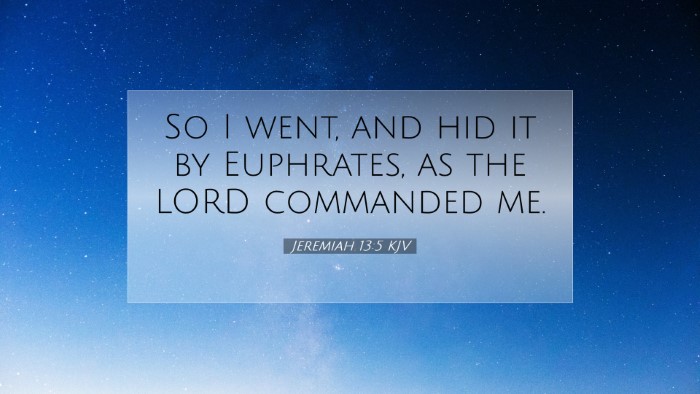Commentary on Jeremiah 13:5
Jeremiah 13:5: "So I went and hid it by Euphrates, as the Lord commanded me."
Introduction
This verse stands as an illustration of the prophetic actions of Jeremiah, who often used symbolic acts to convey God's messages to Israel. In this commentary, we will explore the significance of Jeremiah's command to hide a linen girdle by the Euphrates and the broader implications of this action in relation to God's covenant and the impending judgment on Judah.
Analysis of the Verse
In Jeremiah 13:5, we witness the obedience of the prophet as he fulfills God's directive. The act of hiding the girdle has deeper symbolic meanings that can be deciphered through various public domain commentaries.
Context and Theological Significance
Jeremiah's actions are often set against the backdrop of Israel’s disobedience and the consequences that arise from forsaking the covenant with God. According to Matthew Henry, the girdle represents the pride of Israel, and hiding it signifies a warning against the spiritual deterioration that the nation was experiencing. The girdle's position near the Euphrates, a significant river in the region, underscores the prophetic declaration of loss that will follow due to their unfaithfulness.
Albert Barnes notes that the physical act of hiding the girdle demonstrates the seriousness of God's message. Just as the girdle, which was meant to be useful, becomes useless when hidden, so too is the nation’s ability to sustain itself spiritually under the weight of its sins diminished. The Euphrates, a river that often connoted life and sustenance, would become a grave marker for the impending judgment; it becomes a place of hiding for something that would no longer serve its purpose.
Moreover, Adam Clarke emphasizes that the girdle’s hidden state illustrates the fate of Judah; their glory would be hidden, leading to a loss of identity and purpose similar to the girdle itself. The prophet's obedience is highlighted as essential, indicating that true prophetic ministry often involves acts of faith that may seem peculiar or illogical to the public eye.
Symbolism of the Girdle
The girdle, in biblical terms, often symbolizes strength, readiness, and truth—qualities intrinsic to God's people. The act of tying it around oneself is an image of preparedness in service and obedience. As per Henry’s commentary, the girdle's decay signifies the collective spiritual degradation of Israel. Just as this article of clothing receives its strength from being tied closely to the human body, so too does Israel gain its strength from covenant fidelity to God.
In contrast, when the girdle is hidden—largely symbolic of isolation from God’s purposes—it illustrates a severing of the relationship between Israel and God. Barnes alludes to the metaphorical implications: a girdle worn loosely is nearly useless, reflecting the loose ties the people of Israel had with their God. Their sins would lead to a forfeiture of their divine support, much like the girdle that loses its utility when hidden away.
Theological Implications for Contemporary Believers
The insights derived from Jeremiah 13:5 resonate with the condition of the modern church and individual believers. The call to obedience shown through Jeremiah serves as a reminder that God's directives may not always align with our understanding or expectations. The act of hiding the girdle is not merely a historical narrative but speaks to the need for vigilance in our spiritual lives.
- Spiritual Readiness: As Clarke suggests, we are called to be vigilant and prepared, wearing our faith as a girdle. Believers must understand the necessity of being actively engaged in their spiritual combat, relying not only on external variables but internal fortitude derived from God.
- Faithfulness in Obedience: The specificity of God’s command reflects the importance of responding faithfully to His whispers in our lives. The act of hiding signifies withdrawal; believers are urged to remain visible in their faith and trust, avoiding the temptation to retreat when circumstances grow dire.
- Consequences of Sin: This prophetic action elucidates the consequences of straying from God. As the nation faced impending calamity, contemporary followers of Christ are called to self-examination, ensuring they do not lose their purpose through unrepentant sin.
Conclusion
In summary, Jeremiah 13:5 encapsulates profound theological truths and practical applications for modern-day believers. Through the lens of historical narrative, symbols, and the voices of esteemed commentators, we are drawn into deeper reflections on our relationship with God. The weight of obedience and the consequences of spiritual neglect are woven throughout this passage, encouraging today’s pastors, theologians, and scholars to seek a robust engagement with Scripture that informs their spiritual journeys and the ministry of the church.


